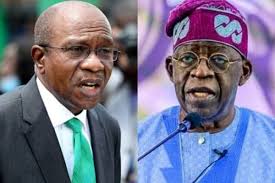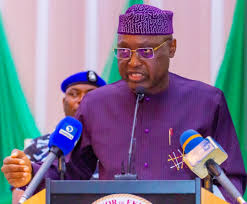The Battle to Break Tinubu Is a Battle to Break Nigeria

By Idowu Ephraim Faleye
Let’s not pretend anymore—there’s a powerful undercurrent in Nigeria’s political waters today, and it’s flowing fiercely against President Bola Ahmed Tinubu. What’s happening isn’t just the usual political noise. It’s a carefully orchestrated campaign by a group of powerful interests who feel threatened, not just politically, but economically and historically. And the reasons they want Tinubu out of power, at all cost, go deeper than most people realize.
This whole struggle didn’t start today. To understand what’s happening now, we must go back to a conversation between Prof. Omo Omoruyi and General Ibrahim Babangida, a conversation that sheds raw light on how deep the Northern establishment’s fear of Southern leadership runs. That conversation, documented in Omoruyi’s book The Tale of June 12, reveals a mindset that is both old and dangerously persistent.
At the heart of that discussion was a message from the Sultan of Sokoto. He warned General Babangida that allowing the election of Chief MKO Abiola, a Yoruba man and fellow Muslim, would undo the gains the North had made since independence in 1960. Imagine that. Even though MKO was well-liked and not seen as a threat in personal terms, his ethnic identity alone made him unacceptable to Northern power brokers. The Sultan made it clear that the North could not afford a Yoruba presidency. He believed it would shift the balance of power and allow the South-West to reverse decades of Northern dominance.
According to the account of Prof. Omoruyi, a message was sent to Babangida: the June 12 election must not go forward. And Babangida, in a moment of candor, told Omoruyi that Yoruba people behave as if Nigeria cannot move forward without them, adding that the Igbo should teach them a lesson. It was a disturbing statement. But it revealed the hidden bitterness and competition that have plagued Nigeria’s leadership structure for years. It also showed how much fear and hatred of Southern ascendancy still exists behind closed doors.
What played out in 1993 is no different from what we are seeing today. The same fear, the same desperation, the same tactics. President Tinubu has become a symbol of what the Northern elite fear most—a Southern leader who is independent, bold, and difficult to control. Tinubu is not Obasanjo, who was handpicked and trusted by the same establishment to protect their interests. Unlike Obasanjo, who once ruled as a military head of state and was widely seen as someone who would “play ball,” Tinubu came through the hard way. He built his political machinery from the ground up, led the opposition for years, and earned his victory through grit, strategy, and the power of the people. And now that he’s in power, he is not dancing to their tune. That’s the real problem.
What has Tinubu done that is shaking the foundations of these powerful interests? He’s disrupting their long-standing economic privileges. The removal of the petroleum subsidy alone cut off a major pipeline of wealth for many of them who had benefited for years without any accountability. Oil bunkering, illegal mining, black-market foreign exchange deals, non-payment of taxes, and outright stealing of public funds in public service without questioning were part of the economic lifestyle of Northern elites. These acts weren’t just tolerated—they were part of an entrenched system of plundering Nigeria. Tinubu’s reforms are exposing that system and trying to shut it down.
And the reforms, though tough, are not without purpose. They are aimed at building a stronger economy, reducing waste, and making the country work for everyone—not just a privileged few. But those who have fed fat on the nation’s commonwealth for decades see it differently. To them, Tinubu’s policies are not reforms—they are threats. They see every policy as a move to dismantle their empire. And they cannot take it.
So, what are they doing? They are regrouping (COALITION). They are calling on their “best eleven”—political heavyweights, media propagandists, religious leaders, and ethnic champions. They are aligning with angry politicians, including those from the South who lost out in the last elections. They are funding protests, sponsoring misinformation, and sowing discontent. They are trying to present Tinubu’s government as a failure. Not because he has failed, but because they are desperate to make the people turn against him.
This playbook is not new. It’s the same strategy they used against former President Goodluck Jonathan. Remember how they resisted every effort to transmit power to him after the death of President Yaradua? How they labeled him incompetent, weak, and clueless? They made the country ungovernable and pushed him out using every conventional and unconventional method at their disposal. Now, they want to repeat that same script—only this time, the target is Tinubu.
But Nigerians must ask themselves: is this really about Tinubu? Or is it about a group of people trying to protect their unchecked access to power and wealth? The bitter truth is this—if we allow these forces to succeed, Nigeria will return to the same cycle of backwardness we’ve been trying to break since independence. The old system will come back stronger, bolder, and more ruthless. The same forces that have looted our resources, underdeveloped our regions, and used religion and ethnicity to divide us will be back in control. All the efforts to create a fair and just Nigeria will be wasted.
No one is saying President Tinubu has done everything perfectly. No leader ever does. But what he represents is a turning point in Nigeria’s political history. For the first time in a long while, the person at the top is not a puppet. He is not afraid to make hard decisions. He is not waiting for approval from a hidden cabal. He is trying to steer the country in a new direction—away from waste, corruption, and economic sabotage. And that is why they want him out.
The fight against Tinubu is not just about politics—it is about power, privilege, and control. It is a battle between the old Nigeria and the new Nigeria. A battle between those who want change and those who want things to stay the same because they benefit from it. A battle between progress and sabotage.
But this time, we must not let them win. We must see through the lies, the propaganda, and the distractions. We must recognize what is at stake—not just for Tinubu, but for all of us. If they succeed in removing him, they will also remove every hope for real change in this country. If they succeed, they will send a message that no Southern leader who is not a puppet can ever survive in power. If they succeed, they will kill the dream of a balanced Nigeria where leadership is based on merit, not manipulation.
This is the moment for Nigerians to stand firm. Not because Tinubu is perfect, but because Nigeria deserves a chance to be governed by someone who is not beholden to any hidden masters. We must support the reforms. We must endure the temporary pain for the promise of lasting gain. We must resist the attempts to throw the country back into chaos just to satisfy the greed of a few.
Because if we allow them to remove Tinubu now, we are not just removing a president—we are removing our last chance at true national progress. Let’s not betray our future. Let us stay the course. Let us protect the reforms. Let us defend the hope. Because this time, the change must not be stopped.
Idowu Ephraim Faleye writes from Ado-Ekiti





